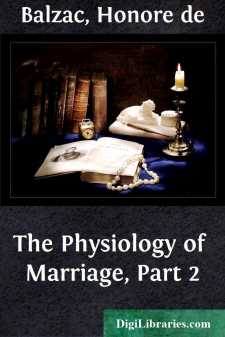Categories
- Antiques & Collectibles 13
- Architecture 36
- Art 48
- Bibles 22
- Biography & Autobiography 813
- Body, Mind & Spirit 142
- Business & Economics 28
- Children's Books 17
- Children's Fiction 14
- Computers 4
- Cooking 94
- Crafts & Hobbies 4
- Drama 346
- Education 46
- Family & Relationships 57
- Fiction 11829
- Games 19
- Gardening 17
- Health & Fitness 34
- History 1377
- House & Home 1
- Humor 147
- Juvenile Fiction 1873
- Juvenile Nonfiction 202
- Language Arts & Disciplines 88
- Law 16
- Literary Collections 686
- Literary Criticism 179
- Mathematics 13
- Medical 41
- Music 40
- Nature 179
- Non-Classifiable 1768
- Performing Arts 7
- Periodicals 1453
- Philosophy 64
- Photography 2
- Poetry 896
- Political Science 203
- Psychology 42
- Reference 154
- Religion 513
- Science 126
- Self-Help 84
- Social Science 81
- Sports & Recreation 34
- Study Aids 3
- Technology & Engineering 59
- Transportation 23
- Travel 463
- True Crime 29
Madame Firmiani
by: Honore de Balzac
Categories:
Description:
Excerpt
MADAME FIRMIANI
Many tales, either rich in situations or made dramatic by some of the innumerable tricks of chance, carry with them their own particular setting, which can be rendered artistically or simply by those who narrate them, without their subjects losing any, even the least of their charms. But there are some incidents in human experience to which the heart alone is able to give life; there are certain details—shall we call them anatomical?—the delicate touches of which cannot be made to reappear unless by an equally delicate rendering of thought; there are portraits which require the infusion of a soul, and mean nothing unless the subtlest expression of the speaking countenance is given; furthermore, there are things which we know not how to say or do without the aid of secret harmonies which a day, an hour, a fortunate conjunction of celestial signs, or an inward moral tendency may produce.
Such mysterious revelations are imperatively needed in order to tell this simple history, in which we seek to interest those souls that are naturally grave and reflective and find their sustenance in tender emotions. If the writer, like the surgeon beside his dying friend, is filled with a species of reverence for the subject he is handling, should not the reader share in that inexplicable feeling? Is it so difficult to put ourselves in unison with the vague and nervous sadness which casts its gray tints all about us, and is, in fact, a semi-illness, the gentle sufferings of which are often pleasing? If the reader is of those who sometimes think upon the dear ones they have lost, if he is alone, if the day is waning or the night has come, let him read on; otherwise, he should lay aside this book at once. If he has never buried a good old relative, infirm and poor, he will not understand these pages, which to some will seem redolent of musk, to others as colorless and virtuous as those of Florian. In short, the reader must have known the luxury of tears, must have felt the silent pangs of a passing memory, the vision of a dear yet far-off Shade,—memories which bring regret for all that earth has swallowed up, with smiles for vanished joys.
And now, believe that the writer would not, for the wealth of England, steal from poesy a single lie with which to embellish this narrative. The following is a true history, on which you may safely spend the treasures of your sensibility—if you have any.
In these days the French language has as many idioms and represents as many idiosyncracies as there are varieties of men in the great family of France. It is extremely curious and amusing to listen to the different interpretations or versions of the same thing or the same event by the various species which compose the genus Parisian,—"Parisian" is here used merely to generalize our remark.
Therefore, if you should say to an individual of the species Practical, "Do you know Madame Firmiani?" he would present that lady to your mind by the following inventory: "Fine house in the rue du Bac, salons handsomely furnished, good pictures, one hundred thousand francs a year, husband formerly receiver-general of the department of Montenotte." So saying, the Practical man, rotund and fat and usually dressed in black, will project his lower lip and wrap it over the upper, nodding his head as if to add: "Solid people, those; nothing to be said against them." Ask no further; Practical men settle everybody's status by figures, incomes, or solid acres,—a phrase of their lexicon....






















